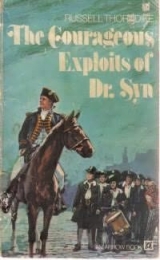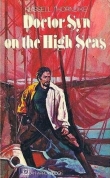
Текст книги "The COURAGEOUS EXPLOITS OF DOCTOR SYN "
Автор книги: Russell Thorndike
Жанр:
Исторические приключения
сообщить о нарушении
Текущая страница: 10 (всего у книги 16 страниц)
9
DOCTOR SYN’S CHRISTMAS MUMMERS
In the days when Doctor Syn was Vicar of Dymchurch-under-the-Wall in the county of Kent, Yuletide was observed
with the fullest ceremonial of ancient days.
Himself and Sir Antony Cobtree, the popular Squire and First Lord of the Level on Romney Marsh, had been
students at Queen’s College, Oxford, which has always maintained the Christmas ritual of the Boar’s Head, so that it
was not surprising to find in the hall of the Court House, the Squire’s residence, that this delightful custom was
carried out faithfully with the half-Latin, half -English carol, sung with due solemnity to the enjoyment of all the
Squire’s guests at Christmas dinner.
Both Squire and Vicar loved such curious whimsicalities, and perhaps the church choir who snag the carol,
headed by “Doctor Syn himself in the part of the Cantor with a cook’s cap upon his reverend head, and the great
dish held by the Squire’s servants above him at their arms’-length, was only eclipsed by the entertainment that
followed on Christmas night. This was a play given by the local talent of the parish, and performed much as the old
mummers had enacted if for generations upon other floors for stages than those on Romney Marsh. Doctor Syn,
with a great love of drama, made a point of coaching the parishioners himself. They had enacted under his direction
many old forms of Christmas Revels, but on the particular year when Captain Blain was guest at the Vicarage, and
his men were quartered for the festival in the Tythe Barn, the good Doctor was determined to give his audience a
more original entertainment that would in a spirit of Christmas fun hold out the finger of scorn at all the failings and
failures of the year. The rehearsals had been carried out with the utmost secrecy, and all actors had been put under
vow not to divulge anything of the matter to those not in the cast.
Now although the chief performance of the Dymchurch Mummers was the one presented at the Court House on
Christmas evening, there were others held on other nights by the same players in other great houses. Indeed all the
Lords of the Level extended Yuletide hospitality to their tenants, rich and poor, and the dates of such festivities were
fixed by the various hosts for the convenience of Doctor Syn’s Mummers who came to form the chief item of
entertainment.
At every manor where these players were asked to perform, there was more than enough food and drink for any
who cared to attend, and those who could walk or ride followed the Mummers wherever they went in order to
partake in yet another feast.
Next in importance to the Dymchurch performance (which was ever the most popular because Sir Antony
Cobtree was the host) was that given at Lympne Castle by Sir Henry Pembury upon the following night.
The castle hall was thronged not only by the tenants on the hills of Lympne and Aldington, but by everyone who
could climb the inland cliff from the Lower Levels of the Marshes. Three districts these Marshes: Romney,
Welland and Denge.
Sir Henry, Lord of Lympne, not only threw his castle doors open to all the common folk who cared to come, but
took the occasion of this Boxing Night Revel to send invitations to all the immediate gentry, most of whom joined in
the dancing that followed the play.
Long before the performance of the festivities about to be described, Sir Henry, hearing form Doctor Syn that
since Dymchurch was honored by harboring so many King’s men in the shape of hands from the Dover guard Ship
and a squadron of Dragoons from Dover Castle, the play had been given extra attention, and was in his opinion well
worth seeing, the fat and pompous Lord of Lympne sent out more invitations than ever before. He left nobody out,
and begged all to come.
One and all gladly accepted with thanks except Captain Blain who curtly replied that he and his men would have
witnessed the play the night previously at the Dymchurch Court House, and that he could not so far play into the
Scarecrow’s hands, as to leave the Marsh when no doubt all good citizens would have left it for Lympne Castle. “It
is a great night for a ‘run’, and no doubt the scarecrow would have been delighted to think that I could leave my post
and the road clear for him. But such a thing I do not intend to do, and should you have an inkling who the rascal is,
you may tell him what I now write to you, declining your kind though misplaced invitation.”
This reply naturally sent the Squire of Lympne into a great rage, and Doctor Syn, who knew something of the
matter, mounted his fat white pony and jogged along to Lympne Castle as a mediator. He had told his guest,
Captain Blain, that in his opinion he had failed to show tact or any tolerance towards an older man, which was
reprehensible during the season of peace on earth and goodwill towards men, and finally he had ridden to the
aggrieved Squire with something of an apology in the Captain’s writing.
On entering the library of the castle, Doctor Syn at once perceived that the Squire was in one of his worst
tempers. He was sitting before the great fire in a large chair with a table at its side, and upon the table lay a letter
which the old lord seemed to be scowling at.
“Come in, and welcome, doctor,” cried Sir Henry. “If you heard me muttering somewhat fretfully when you
entered so quietly, it had nothing to do with you, whom I am always most happy to welcome to the castle. I dare say
you did hear me muttering, eh?”
“To be perfectly frank,” replied Doctor Syn with a smile, “I heard nothing of a fretful muttering, but a good deal
of honest swearing. In fact, that is why I have mounted Lympne Hill. I guessed you would be swearing, and getting
your good self into a high pother which Doctor Sennacharib Pepper declares is so bad for you, and so I came to help
you by erasing the letters which have caused you so much ado.”
The Squire picked up the letter from the table and shook it in the air. “This is the most impertinent letter I have
ever received in my life, Doctor Syn. I should have thrown it into that fire on my first reading of it, but that the
sheer effrontery of the words makes me read it over and over again.”
“Then, sir, refrain from reading it any more,” said Doctor Syn in a soothing tone. “This is a time of year when all
good men like your honored self should be ready to hold out the hand of forgiveness to his worst enemy.”
“That I will never do in this case,” cried the Squire. ‘Not even upon the advice of a saint like yourself, Reverend
Sir. The writer is one that I hate, and shall always hate most fiercely. A traitor and an unmitigated scoundrel.”
“Oh, come now, Sir Henry,” went on the Vicar. “I think you wrong him there, upon my soul. No one who
knows anything of him could question his bravery.”
“Many a scoundrel has been brave,” interrupted the Squire.
“And as to his being a traitor,” went on the parson, “his whole life’s career gives the lie to that.”
“Oh, aye,” nodded the Squire sarcastically. “He’s loyal enough to his own men it is said, but then that is only to
his own advantage. This letter to my mind is the saucy culmination of a million impertinences in a scandalous
career.”
“Now listen, sir,” urged Doctor Syn. “I bring you a written apology from Captain Blain, and”
“Damn the Captain and his apologies too,” shouted the Squire.
“I am sorry you take it so badly,’ replied the Parson.
“The Captain is small fry and don’t matter a damn, Parson,” retorted Sir Henry.
“He is at least big enough, sir to own his fault against you and ask pardon,” argued the Vicar. “And to prove my
words I have here a letter which I must ask you to read.”
“I’ll read no more letters,” cried the Squire with rising irritation. “This one is quite enough to last me a lifetime.”
“But I say that you should forget about it, sir, in view of the other letter I now bring you.”
“Now see here, Doctor Syn. And I will endeavor to be calm while I convince you that you have no idea what
you are talking about. The Captain’s letter was merely silly.”
“And he owns so much in this second one,” said the Vicar.
“But this letter here,” continued the Squire, “is not silly. It is terrifying. Yes, Parson, it is exasperating but
terrifying too. And it is not from that disgruntled Captain who is trying to catch the Scarecrow while eating your
good fare at Dymchurch Vicarage. No, it is not from that failure to catch the scoundrel and his smuggling gang, but
it is from HIM. Him himself. I mean HE himself, or what is it?”
“But who is HIM or he himself?” asked the bewildered Parson.
“The Scarecrow, Doctor Syn,” explain ed the Squire. “I keep telling you that his letter in not from Captain Blain
or whatever his name is, but from the Scarecrow, and its impertinence is, as I have said, terrifying.”
“Another letter from the Scarecrow?” asked Doctor Syn.
“Aye, Parson, and worse than the last one I received from him, as you will agree when you hear it, which you
shall.”
“Let me see; the last one you had from him,” said the Vicar, “was a reproof that you had not invited him to the
hunt with the Prince of Wales, and stating that he intended to come, which he did, and much to the Prince’s
amusement. That was bad enough, so please let me know what can be worse.”
“He now invites himself into my house,” replied the Squire. “Aye, he intends to visit Lympne Castle without an
invitation. Before it was at least out of doors. This time it will be within doors. Think of my unmarried daughters.
The danger is frightful.”
With an effort Doctor Syn repressed the smile which he felt inwardly at the thought of the Scarecrow having
designs upon anything so unattractive as the Squire’s unwieldy daughters. Aloud he said: “I think you may dismiss
any fear of harm in that direction. Your young ladies have too many gallant followers, I should hope. So many who
would protect them with their lives.”
“Precious little good that would be,” snorted the Squire. “None knows better than we that the Scarecrow does
what he says he will and diddles everyone. Here, read the letter for yourself, and tell me what to do.”
Doctor Syn adjusted his spectacles and smoothed out the paper which the Squire had crumpled in his rage. It was
written in the usual scrawl that never had failed to disturb its receiver. A rough sketch of a scarecrow was the
signature. The Doctor read it aloud.
“We are informed that as Lord of Lympne Castle you have asked rich and poor alike to your Christmas
junketing. Thanks to the poor attempts to put down the contraband traffic by all concerned, we count ourselves
amongst the rich of this district. We therefore have been expecting to hear from you. Unless you wish us to attend
in the wrong spirit, you had best nail and invitation to us upon the Lympne Hill signpost. When hunting with the
Prince of Wales I did not have the honor of meeting your beautiful daughters, a pleasure I am looking forward to. It
will also be a pleasure to drink a toast beneath the rafters of your historic home.”
“And what do you think of that?” gasped the Squire, as though he had only just learned the contents which he
knew by heart.
“I think that Captain Blain will now certainly accept your invitation,” replied the Doctor. “His men will give
confidence to us all by their presence, and he’ll sit through the play twice without boredom if he thinks he has a
chance of getting his prey.”
“You think the Scarecrow will come, as he says?” asked the Squire.
The Doctor laughed and shook his head. “No, sir, I think the whole thing is a decoy to get the King’s men to the
junketing, as he calls it, in order that he may have a free hand upon the Marsh. But I advise you not to let Captain
Blain think that, for then he will not attend, and in case of accidents it will be as well to have your guests protected
from the scoundrel. Though come to think of it, sir, the rascally Scarecrow is too wise to prepare such a trap for
himself and then, walk boldly into it.”
“Yes, yes, but that’s all very well,” said the Squire testily. “Just the thing he’d enjoy. Prepare a trap, as you say,
and walk into it, and then have the laugh of us all by walking out of it again.”
“I think you will find that I am right this time,” replied the Doctor. “Our play will go through without any
disaster, because the Scarecrow will be busy shifting kegs of brandy on the beach. He will certainly have cause of a
fresh quarrel with me, if he should see the play, for I am afraid that as author I have made many biting allusions
against him, and the great Finale is framed especially to make him the laughingstock of all that are good and true.”
“But is that quite wise for your own safety, Doctor?” asked the Squire. “Even though he is not at the
performance, as you think, he will be sure to hear of it, when it will be discussed by everybody. I think I should
leave the Scarecrow out of it.”
“I am too vain an author, sir,” replied the smiling Vicar. “I could not think of cutting out the best scene in my
play.”
Before taking his leave, Doctor Syn penned a generous acceptance of Captain Blain’s apology which the Squire
of Lympne signed. It contained an urgent appeal for the Captain to bring his men to the festivity, in case the
Scarecrow should be mad enough to make good his boast.
After many weeks of being baffled by the Scarecrow’s wits, Captain Blain would not agree with Doctor Syn that
the letter to Lympne was an idle piece of boasting. He pointed out that the rascal’s threats had always been carried
out, and he had every reason to think that this would be no exception, and he accepted the invitation to the castle on
that ground.
During the days before Christmas, the Captain saw but little of his host, who was busy every evening training his
Mummers in their parts behind the closed doors of the school house. Also the thick snow and severe wintry winds
blowing across the bleak Marsh necessitated the Doctor walking on his parochial visits, which meant that his. hours
were fully occupied. But for all that Doctor Syn was more than ever cheerful, and could be seen striding along
chuckling to himself as he went, over the merry quips and satirical jokes that were going to be good-humoredly
pronounced by his characters. Never before had the village play gone so well, or been more enthusiastically praised
by the critical ones as on that first performance at the Court House.
Even the victims of the many jokes laughed uproariously at their own expense. But it was the final scene that
caused the sensation. When Beelzebub entered shouting, “Here come I, old Beelzebub, and in my hand I carries my
club,” he was rigged out in rags similar to those worn by the Scarecrow. And when he claimed the hand of the
fairest lady in the room, and led hew away to the gates of hell, St. George, throwing off his white battle-cloak, was
seen to be dressed as an Excise officer. It was all voted grand foolery, though Mipps pointed out many an
ablebodied parishioner who seemed to be fearful at laughing too much at the Vicar’s attack upon the dread
Scarecrow. He affirmed that this was even more noticeable amongst the audience during the performance on the
next night at Lympne Castle.
He was right. Rumors of the Scarecrow’s threat to attend had spread abroad, and even those who were most
afraid were persuaded to attend out of curiosity and excitement.
The castle hall was packed. In the front sat Sir Henry Pembury, keeping an anxious eye upon his daughters, the
eldest of whom was sitting next to Captain Blain, and obviously very piqued at his lack of interest in her. At the
best of times the Captain was no man for the ladies, but the sight of Miss Fan, whom her detractors nicknamed the
Dragoon, embarrassed him confoundedly, especially when she patted him playfully upon the sleeve whenever a
flattering allusion was spoken about the King’s good men. Blain was having no truck with such a she-dragon.
Unfortunately for the lady the other seat next to her was reserved for Doctor Syn, who, as the author, kept leaving it
vacant in order to retire behind the great screens that backed the stage. But the last scene cheered her up. On the
entrance of Beelzebub, attended by two Nightriders, she giggled hysterically, especially when the masked devils
brought in a keg of brandy with No Duty chalked upon it, and made the Squire of Lympne take a glass with them.
“And who’s the brave man acting the Scarecrow, miss?’ asked Blain.
“I recognize his voice in spite of his disguise,” she whispered loudly. “It is the eldest Upton boy from
Dymchurch. Very well-looking, too. It is a pity he is masked so hideously. They are a very worthy family, as no
doubt you know.”
“The Scarecrow won’t approve of him,” growled the Captain. “He’ll be needing my protection I fancy.”
When this actor came to the front row and chose her as the fairest in the room, her delight and coyness knew no
bounds. Everyone knew that this was but a compliment to their host, but Miss Fan took it as a compliment to her
beauty. She accepted his hand and to the applause of the audience walked with him to the back of the stage so that
the Lord from darkness could salute her under the mistletoe. On their disappearance St. George came forward to
make his heroic speech, and was applauded for some minutes, and the audience could hear the actors behind the
screens whispering and asking for Doctor Syn.
After some minutes of an embarrassed wait the officious Mipps popped behind the screens to investigate. After
another wait he reappeared, craving the audience’s indulgence.
“The fact is, my lords, ladies and gentlemen,” he said solemnly, “our principal actor appears to have disappeared.
What’s more, he seems to have took off Miss Pembury with awaiting to step forward at the conclusion of his play
to accept your kind applause. He’s gone, too. Perhaps he’s a-chaperoning Miss Pembury, for the back door is open
on to the terrace.”
Suddenly Captain blain sprang to his feet. “Mr. Mipps,” he cried out, “who was acting the part of the Devil?”
“We ain’t supposed to tell,” replied Mipps, “but if you must know it was one of them Uptons. Good, too.”
“Was it?” replied the Captain. “Aye and he may be ‘was’ unless we’re quick. Sir Henry Pembury, I believe the
Scarecrow has kept his word. I believe he has carried off your daughter under our noses. Quick, men. Fall in and
follow me.”
There followed a general stampede of those brave enough to venture out of the door to the terrace. The King’s
men with drawn cutlasses pushed their way out, and the first sight that met their eyes was a dishevelled Miss Fan
lying in the snow on the terrace steps.
Captain Blain seized hold of her and gave her a rough shaking as he shouted, “Where did he go?”
Miss Fan pointed to a great tree at the foot of the terrace and then uttering a scream, fainted.
Leaving his heavy burden to be taken care of by others who were thronging out on to the terrace, the Captain,
followed by his men, ran down the steps, and stumbled through the thick snow to the tree in question, where they
found Doctor Syn and the eldest young Upton lashed to the trunk with coils of rope.
And away down the hill towards the Marsh they saw the hoof-marks of a horse.
Before the old Doctor could recover his speech, young Upton explained.
“We’ve been here for some minutes. We were seized, the Doctor and me, and dragged out here. It was Nightriders because we saw the great black horse, standing with three others which another Nightrider held. Presently
out comes the Scarecrow with Miss Pembury in his arms. He seemed to be disentangling himself from her arms
which were clutched round his neck. He finally got free of her and laid her in the snow, and then they all mounted
and rode off single file down towards the Marsh.”
When Doctor Syn recovered later in the castle, he smiled at Sir Henry and said: “You were right , sir. I was
punished for making fun of the Scarecrow. What I cannot make out though is how did the rascal play his part so
well according to you.”
“Most likely he watched it last night in the Dymchurch Court House,” suggested the Captain. “He was, in my
opinion, a better actor than poor young Upton.”
The next day Doctor Syn went out though the snow to visit a dying woman. On the way back, however,
unknown to anyone, he visited Jimmie Bone, the Highwayman, in the Scarecrow’s hidden stable.
“I hear, my good friend,” laughed the Doctor, “that your performance was magnificent. I hope you enjoyed it as
much as the audience.”
“My very revered Scarecrow,” replied the Highwayman, “had I known all, I fear I should not have obeyed you.
That Pembury woman, when I told her that I was the scarecrow in truth, clung to me tighter than ever. I can feel her
heart beating against me now. I always had an eye for a pretty wench, but oh, that woman!”
“Avoid all such conceit,” reproved the Parson. “No doubt she clung to you in order to get the thousand guineas
on the Scarecrow’s head. You must not misinterpret her motive.”
“Wee, I’ll never hold up old Pembury’s coach again, in case she embraces me again.” Laughed the Highwayman.








